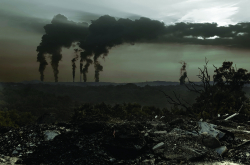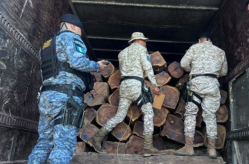LYON, France – A global operation led by INTERPOL involving 61 countries and regional law enforcement partners has identified thousands of illicit activities behind severe marine pollution.
Codenamed 30 Days at Sea 2.0, the month-long (1-31 October) operation gathered more than 200 enforcement authorities worldwide for concerted action across all continents.
Illustrating the severe global extent of marine pollution crime, preliminary operational results have already revealed more than 3,000 offences detected during 17,000 inspections.
The offences - such as illegal discharges at sea, in rivers, or in coastal areas - were found to have been committed primarily to avoid the cost of compliance with environmental legislation.
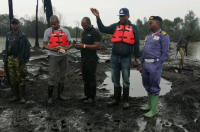
Safeguarding sustainable development and public health
As part of Operation 30 Days at Sea 2.0, INTERPOL hosted an Operational Command Centre (OCC) in Singapore to focus on the illegal trade in plastic waste, a key threat to marine environment security.
The OCC brought key countries together to trigger investigations into cases of illegal export or import of plastic waste.
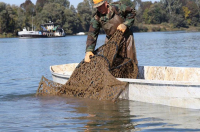
“INTERPOL has a powerful role in coordinating effective global multi-agency action to help countries tackle this serious form of pollution crime.
“We have already seen significant results from the action days but the work will and must continue to identify those behind these crimes who are making a profit at the cost of our environment,” added the head of INTERPOL.

Transnational and interagency cooperation: a stronger response
The European leg of 30 Days at Sea 2.0 was coordinated in cooperation with Europol and Frontex - the European Border and Coast Guard Agency.
“With incidents of maritime pollution increasing significantly over the last decade, and as Europol considers maritime pollution to be a priority environmental crime area, we are proud to coordinate this operation within the EU Member States in active cooperation with our colleagues from INTERPOL and Frontex,” said Europol Executive Director Catherine De Bolle.
“The nature of maritime pollution requires a coordinated and multi-agency approach on a global scale : the impressive results of the second edition of ‘Operation 30 Days at Sea’ illustrate once more what can be achieved when law enforcement agencies work together with the support of the EU and global organisations,” added the Europol Chief.
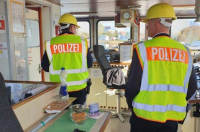
“We are proud that we helped track down severe maritime pollution as part of Operation 30 Days at Sea 2.0 because we take the protection of our seas very seriously,” said Frontex Executive Director Fabrice Leggeri.
“Frontex helped monitor and patrol the Mediterranean with its various services and planes and ships taking part in Frontex maritime joint operations,” added Mr Leggeri.
The operation also served to trigger new and stronger working partnerships between national agencies in some countries, which in turn boosted operational results and sustainable cooperation mechanisms.

In Nigeria, INTERPOL’s National Central Bureau in Abuja coordinated the action of 18 authorities through a task force created to conduct inspections into illegal oil refineries, found responsible for severe oil leakages polluting the country’s waterways.
Information exchanged between Malaysia and The Netherlands permitted authorities to identify the source country of seven containers of plastic waste being illegally shipped into Malaysia from Belgium via Hong Kong, and to initiate their repatriation.
As part of the operation, some countries increased collective commitment to tackling plastic pollution crime through awareness campaigns in addition to enforcement actions.

Ecuador conducted a plastic waste collection campaign in the World Heritage site of the Galapagos Islands, resulting in the removal of more than 600 kg of refuse.
Indonesian authorities launched a public awareness campaign on national law enforcement’s newly strengthened approach to tackling marine pollution.
INTERPOL is now working with more than 100 enforcement agencies worldwide on investigations triggered by Operation 30 Days at Sea 2.0.
Follow the hashtags #PollutionCrime and #30DaysatSea on Twitter for further information on the operational successes.
Enhancing the role of law enforcement to protect the marine environment
The 30 Days at Sea 2.0 operational phase is part of a broader cycle of actions towards Marine Pollution Enforcement, at the international and national levels.
INTERPOL’s Pollution Crime Working Group brought together 200 national enforcers and experts last November in Brussels for its 24th annual meeting where enhanced detection and disruption of pollution criminal groups were high on the agenda.




